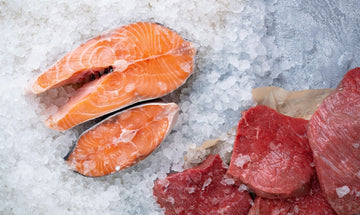Protein Deficiency: 6 Warning Signs You Shouldn't Ignore
by Emily Jannet on Feb 14, 2024
Protein is an essential nutrient that plays a crucial role in various bodily functions, from building and repairing tissues to supporting immune function and hormone regulation. Yet, despite its importance, many people fall short of meeting their daily protein needs. If you're experiencing any of the following signs, it could be an indication that you're not getting enough protein in your diet—and here's what you can do about it.
-
Constant Fatigue and Weakness
Feeling tired and weak on a regular basis could be a sign that you're not consuming enough protein. Protein is vital for muscle repair and growth, as well as for providing sustained energy throughout the day. Without an adequate intake of protein, your muscles may not recover properly after exercise, leading to fatigue and weakness.
To combat this, aim to include a source of protein in every meal and snack. Foods such as lean meats, poultry, fish, eggs, dairy products, legumes, nuts, and seeds are excellent sources of protein that can help replenish your energy levels and support muscle recovery.
-
Frequent Illnesses and Slow Recovery
Protein plays a crucial role in supporting a healthy immune system. It helps produce antibodies that fight off infections and supports the repair and regeneration of tissues. If you find yourself falling ill frequently or experiencing slow recovery from illnesses and injuries, inadequate protein intake could be a contributing factor.
Boost your protein intake by incorporating a variety of protein-rich foods into your diet. Additionally, consider adding a high-quality protein supplement, such as whey protein powder, to your routine to ensure you're meeting your body's needs for immune support and tissue repair.
-
Hair Loss or Brittle Nails
Protein is essential for maintaining the health of your hair, skin, and nails. Insufficient protein intake can lead to hair loss, thinning hair, and brittle nails. This is because protein provides the building blocks necessary for the growth and repair of these tissues.
To promote healthy hair, skin, and nails, focus on consuming a balanced diet that includes an adequate amount of protein-rich foods. Incorporate sources of protein such as eggs, fatty fish, nuts, seeds, and legumes into your meals to support optimal hair and nail growth.
-
Difficulty Losing Weight or Building Muscle
Protein plays a key role in both weight loss and muscle building. It helps increase feelings of fullness, reducing appetite and cravings, which can aid in weight loss efforts. Additionally, protein is essential for building and repairing muscle tissue, making it crucial for individuals looking to increase muscle mass and strength.
If you're struggling to lose weight or build muscle, consider increasing your protein intake. Aim to include a serving of protein with each meal and snack, and prioritize lean sources of protein to support your goals. Additionally, consider working with a registered dietitian or nutritionist to develop a personalized meal plan that meets your specific needs.
-
Poor Concentration and Brain Fog
Protein plays a vital role in cognitive function and brain health. It provides the amino acids necessary for the production of neurotransmitters, which are chemicals that transmit signals between nerve cells in the brain. Insufficient protein intake may lead to poor concentration, brain fog, and cognitive decline over time.
To support optimal brain function, make sure to include protein-rich foods in your diet regularly. Foods such as fatty fish, eggs, poultry, tofu, and dairy products are rich in protein and can help support mental clarity and focus.
-
Muscle Cramps and Weakness
Protein is essential for maintaining muscle health and function. It provides the amino acids necessary for muscle repair and growth, as well as for supporting muscle contraction and relaxation. Inadequate protein intake may lead to muscle cramps, weakness, and decreased exercise performance.
To prevent muscle cramps and weakness, prioritize protein-rich foods in your diet and aim to consume an adequate amount of protein each day. Additionally, make sure to stay hydrated and incorporate electrolyte-rich foods such as bananas, spinach, and sweet potatoes into your meals to support optimal muscle function.
In conclusion, protein is an essential nutrient that plays a critical role in various aspects of health and well-being. If you're experiencing any of the signs mentioned above, it could be a sign that you're not getting enough protein in your diet. By increasing your intake of protein-rich foods and prioritizing protein at every meal, you can support optimal health and performance and ensure you're meeting your body's needs for this vital nutrient. If you're unsure about how much protein you should be consuming or need personalized dietary advice, consult with a registered dietitian or nutritionist for guidance tailored to your individual needs and goals.





